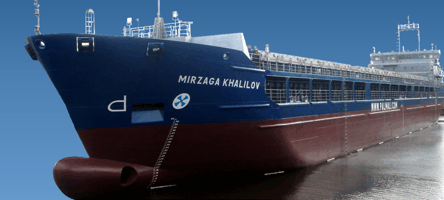 16.02.12 11:40 16.02.12 11:40
About concepts' creation for new generation of river-sea going vessels for cargo transportations from Dnieper to Danube
  On February 15, 2012 degree works examination of three Marine Engineering Bureau (MEB) interns was carried out at Ship Theory and Design Department named for Y.L. Vorobyov at Odessa National Maritime University (ONMU). These works are of single theme, i.e. concepts' creation for new generation of river-sea going vessels for cargo transportations from river ports of Dnieper to ports of Danube-Main-Rhine system. On February 15, 2012 degree works examination of three Marine Engineering Bureau (MEB) interns was carried out at Ship Theory and Design Department named for Y.L. Vorobyov at Odessa National Maritime University (ONMU). These works are of single theme, i.e. concepts' creation for new generation of river-sea going vessels for cargo transportations from river ports of Dnieper to ports of Danube-Main-Rhine system.
Degree works examination attracted intense interest of commission and guests, including MEB representatives and senior staff of Ukraine shipbuilding.
Such project has been carried out for the first time (scientific adviser Ph.D. Sergey Baskakov, director of the department).
General theme "Creation of new fleet for cargo transportation from Dnieper to Danube" included analysis of existing fleet, its operational risks, analysis of cargo flow, creation of general techno-economic assessment and design of concept projects, as follows:
1. "Research design of barge-tug train" of "Dnieper-Max" class" (Aleksandr Egorov is the author );
2. "Research design of dry-cargo vessel" of "Dnieper-Max" class" (Ivan Boyko is the author );
3. "Research design of dry-cargo vessel" of "Rhine-Max" class" (Vladimir Nilva is the author ).
Preliminary design of the following vessels in accordance with Rules of chosen Classification Society (Russian River Register) was worked out in every section.
Conditions analysis of existing fleet of Ukrainian inland and river-sea going vessels (IV and RSV respectively) showed that it is necessary to design and build the vessels of such types in the nearest future. According to the worked out estimations, average age of IV and RSV fleet is of 35 years while rated operational age is of 24 years. According to experts' estimation, mass fleet retirement will take place in 10 years.
Analysis of existing and perspective cargo flows showed that the necessity of IV and RSV will grow in the nearest future, and in all directions of these vessels' operation (Europe - Danube, Russia - inland waterways of European part of Russia and sea ports, Turkey - sea poerts).
It was shown that the most economically sound variant is the operation of barge and tug train of river-sea going type (deadweight is of 6020 tons with the sea draught of 4.50 m and 4220 tons with the river draught of 3.60 m, ME capacity is of 2x1250 kWt, cruising speed is of 10.5 kn) under the condition of stable and guaranteed cargo flows. Operational scheme for such train is so-called "rotator", when 1 tug is operated with 2 or 3 barges, using "sea" tractive connection that allows to push the barge in seas of 6 m.
The most optimal variant with existing cargo flows at Danube and Dnieper is dry-cargo vessel "Dniper-Max" class (deadweight is of 7230 tons with sea draught of 4.70 m and 4600 with river draught of 3.60 m, ME capacity is of 2x1200 kWt, cruising speed is of 10.5 kn).
Dry-cargo vessel of "Rhine-Max" class (deadweight is of 2050 tons with sea draught of 3.00 m, ME capacity is of 626 kWt, cruising speed is of 10.6 kn) is effective while throughout transportation of small "single" cargo installment from Dnieper to European ports of Danube-Mine-Rhine (without transshipment at ports of the Danube), and also while transportation of cargo with low standard of ports' cargo operation, and while "fast delivery" as needed.
Thereby, line of up-to-date dry-cargo vessels for different variants of cargo transportation from Dnieper to Danube (and for other directions) was designed during diploma/(complex master's work) fulfillment.
Character dimensions of Dnieper and RF inland waters are identical so designed solutions are of more general type and can be recommended for using at directions "River ports of RF European part - Danube - Mine - Rhine", transforming easily into vessels of "Volga-Don max" class.
At present day 80 specialists (naval architects, mechanical engineers and electricians) work at Marine Engineering Bureau. Almost all of them have graduated from ONMU (OIIMF), the most part have graduated in XXI century. According to education scheme future employees are invited when they are student of 3 or 4 course. By diploma defense they have already got an experience of participating in several projects, participated into supervision groups at shipyards of Russia, Ukraine and Turkey and have got skills of design using up-to-date CAD systems and calculation programs.
|



